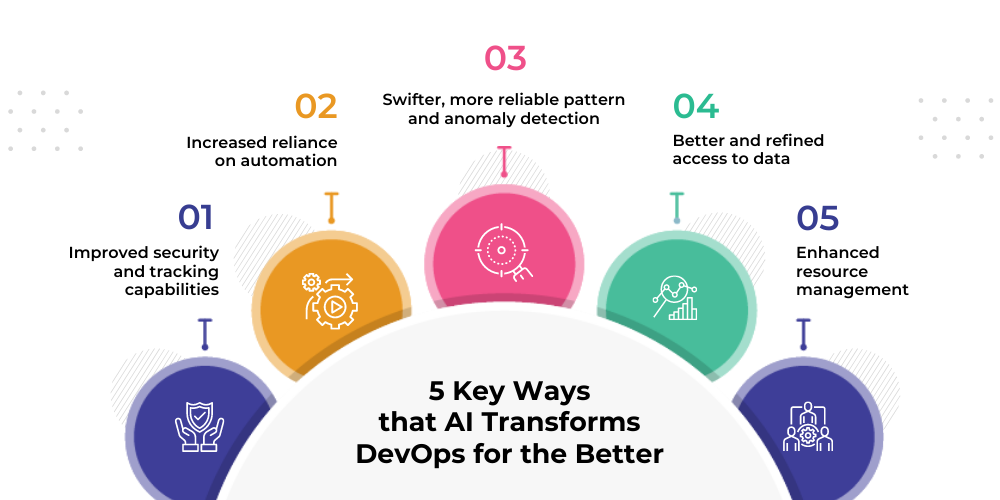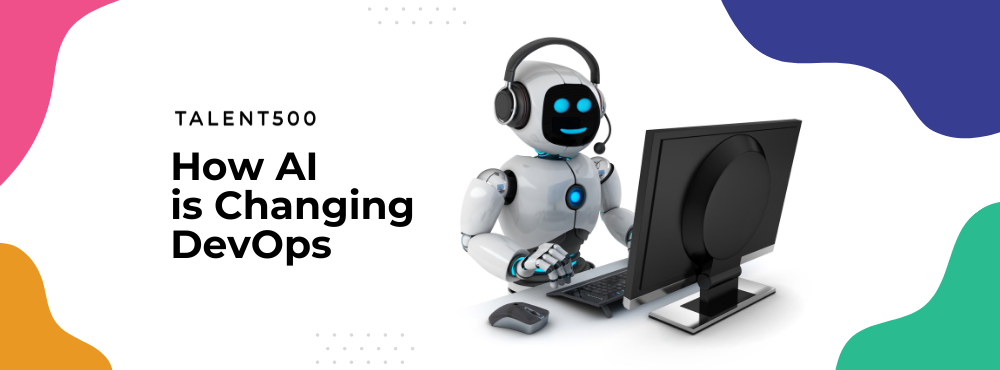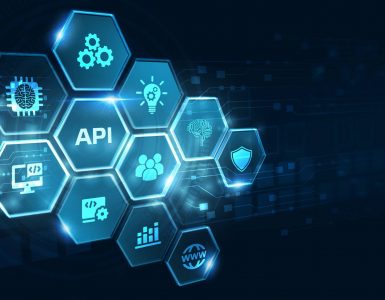While humans are capable of many unthinkable and often impossible feats, there are limitations. One particular area is in data handling, its management, analysis, and interpretation. With the sheer magnitude of incoming raw data, thanks to rapid digitalization, adoption of automation, and several other such factors, relying on human resources alone is inefficient. In a field like DevOps, where high efficiency, accuracy, and speed are all underpinning elements, it seems only natural that artificial intelligence models and technology are a perfect fit.
In fact, DevOps is now a critical piece of the enterprise IT environment, and both AI and ML are readily adopted to increase efficiency. Around 75% use AI and ML for testing and in some cases, this has caused an uptick in new code released by nearly 10X! Considering the nature of the job, it would be near-impossible to do it without the use of advanced technologies. Moreover, AI improves several key DevOps practices and allows teams to leverage their potential to the maximum. It reduces waste by handling large computing scenarios that would otherwise overwhelm human-led operation cycles.
However, recently AI’s application in the DevOps space has brought about rapid change. Several new advancements are afoot, and you should know about them to stay ahead. Read on to know how AI is transforming DevOps.

Improved security and tracking capabilities
A key prowess of AI and ML models is their ability to analyze volumes of data and do it at remarkable speeds with accuracy. As such, its application in tracking and security is undeniable. In a DevOps setting, this advantage comes in handy when analyzing threats and usage data for better optimizations. Since models can be designed to inspect and track user data at every touchpoint, DevOps teams can leverage to deliver a better user experience simply based on data collected by modules doing the heaviest lifting.
On to security, improved tracking capabilities can pinpoint areas in systems that are most vulnerable to breaches. AI better defense against DDOS attacks and can even lend a hand in fraud detection. Since AI models can be designed to spot unusual data patterns and can do this in real-time, tracking and stopping fraudulent acts is a lot more reliable.
Increased reliance on automation
DevOps inherently includes complex systems, run on distributed application environments and operational models. Keeping up and effectively absorbing information isn’t a simple undertaking, especially if it is completely manual. While DevOps does bring some level of automation to the table, AI betters it in every way. With AI, DevOps professionals can leverage the full power of automation to streamline tedious tasks in the operational cycle that were otherwise error-prone due to human involvement.
In fact, this reliance on AI-backed automation has gone so far as to institute systems that can self-heal without requiring external intervention. Essentially, AI can not only jump into the driver’s seat but can get the team there too! However, stubborn DevOps teams are resilient to this level of independent function, but it is only a matter of time until it becomes standard practice.
Swifter, more reliable pattern and anomaly detection
Complex application systems bring with them another problem area — error tracking and analysis. For instance, in an IoT environment with several microservices in use along with its numerous touchpoints, pinpointing failures with accuracy and speed simply isn’t possible. There are troves of raw data to go through and AI models can easily handle these without nearly as much effort. ML and AI models can be designed to look for abnormalities that trigger failure events and even suggest optimizations.
Naturally, when exposed to such analysis over time, these models can be trained to recognize patterns and employ predictive analysis. This lends itself to anomaly detection, which can be vital to DevOps cycles as teams can then address these directly in the development pipeline and ensure they make it out to the live version.
Better and refined access to data
An ever-present challenge to DevOps is the lack of access to complex data streams. With data gushing through every stream and data point in the system, professionals often struggle to keep up. AI models can address such a problem and deliver refined data from various sources and collate them for easy access. In fact, data trapped in siloed operations can also be harnessed to ensure that insight are meaningful.
Enhanced resource management
Certain AI tools lend themselves to non-technical business users, normally in charge of operations. With AI, data mapping and integration can be simplified, and this frees up the IT department for more high-value tasks. In fact, with better data integration, teams are in a better position to innovate, customize, optimize, and grow as the mundane and uninspiring tasks are no longer taking away time and effort. While it may seem like it could result in reduced collaboration, this isn’t the case. Unburdened by technical challenges, the focus is shifted to more big-picture undertakings, which often involve teams across departments to collaborate.
The integration of AI into DevOps is the natural cycle of advancement within the field of software development. There was a time when the traditional development life cycle distinguished development from operations, but in just a few years, it evolved into what we now know as DevOps. Similarly, a new acronym, AIOps, is taking hold and in this new model, the ‘Developer’ is no longer part of the equation. Is this the future of AI? It may still be too soon to tell, but developers would do well to upskill and branch out into other fields that work in line with this technology.
Those with skills that can leverage AI and drive development are sure to find themselves amongst the changemakers in the industry.
If you fit the bill and are looking to work at the bleeding edge of technology at some of the best Fortune 500 companies in the world, sign up on Talent500. The platform can help you take the next crucial step in your career and lay the foundation for your dream career amongst the best of the best.






Add comment